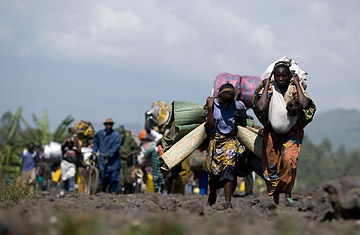
Democratic Republic of Congo Internally Displaced People march into the provincial capital of Goma.
(2 of 2)
There is no quick military solution. With 17,000 troops on the ground, the U.N. force may be the largest the world organization is currently fielding but those peacekeepers have not been able to fulfill even their limited mandate of protecting civilians. Bernard Kouchner, the French foreign minister, has called for the European Union to send reinforcements. This might serve as good out-of-theater training exercise for the European troops but an extra 2,000 boots on the ground — even if the 27-member body could agree on the mission — would do little to address the root causes of the conflict. It would be a showpiece response and not a step toward a permanent solution. (See pictures of Congo on the break of war.)
The economic causes of the conflict need to be addressed. The minerals from the region are hugely profitable both mining conglomerates and armed groups alike — apart from their utility for end users in the developed world. Nkunda, for example, is widely believed to be profiting from the transit of minerals through areas he controls (he claims he is only policing the area to protect ethnic Tutsis). Global Witness, a London based NGO, sent researchers to the the provinces of North and South Kivu this summer and reported back that Hutu armed groups as well as members of the country's armed forces were profiting from the trade in cassiterite, or iron ore. The group wants to exert more pressure on Western governments and companies to prevent profits from ending up in the pockets of combatants. The most important mineral being extracted from the region is tin ore but gold and a substance known as coltan, which is a key mineral used in the making of cell phones, are also being exported from conflict areas.
"Directly or indirectly," says Carina Tertsakian, Congo team leader for Global Witness, "everyone involved in this conflict is benefitting from the trade in these resources except the Congolese people who are the victims of the war." The mining conglomerates have to come under political pressure, she argues. "They aren't likely to stop what they are doing overnight because of an attack of conscience." But choking off this flow of funds is not just about putting pressure on multinational corporations but also about forcing governments in the area, through firm diplomacy and tight financial screws, to uphold protocols and peace processes in order to be in good odor to do legitimate business in the first place. Says Tertsakian, "The economic aspects have been a driving force in this war from the very beginning."
As television screens once again beam images of refugees jamming the red dirt roads of central Africa, and radios broadcast the crackle of gunfire from forested hills, it's clear that something needs to be done. Troops may provide succour for now; but in the long run serious pressure needs to be brought to bear on political leaders until the fighting stops.
As TIME's Nairobi Bureau Chief, Andrew Purvis covered the genocidal conflict in Rwanda in the 1990s. He is now TIME's Berlin Bureau chief.
